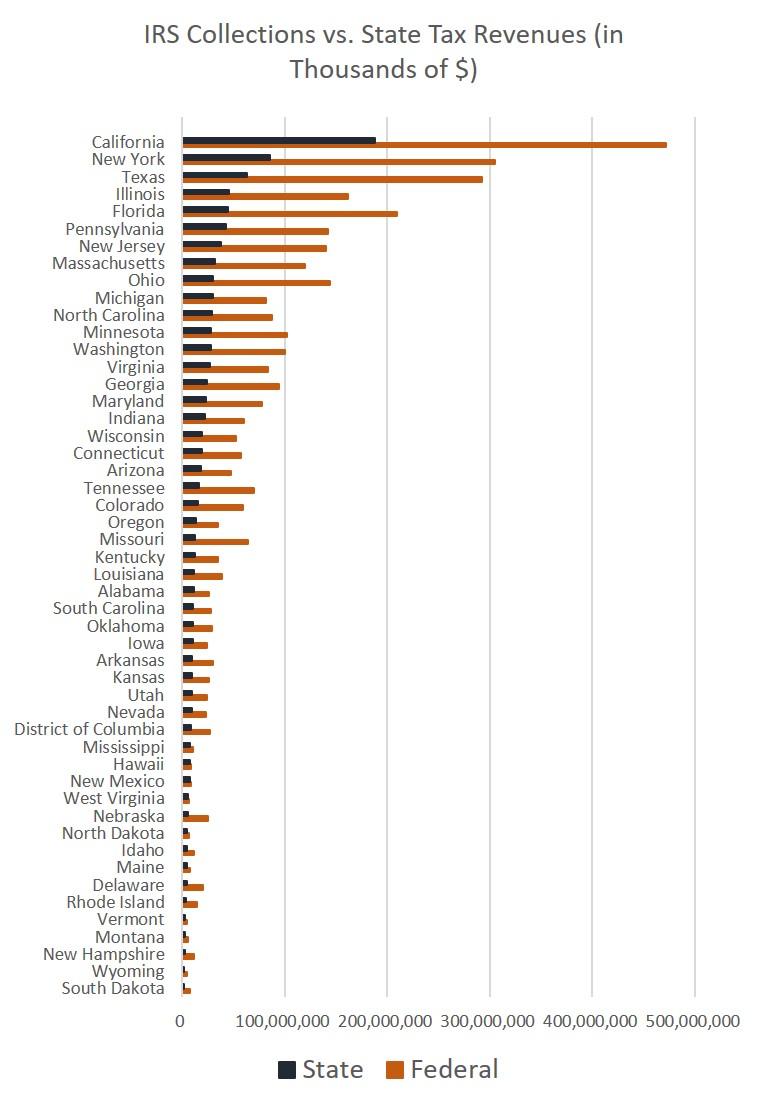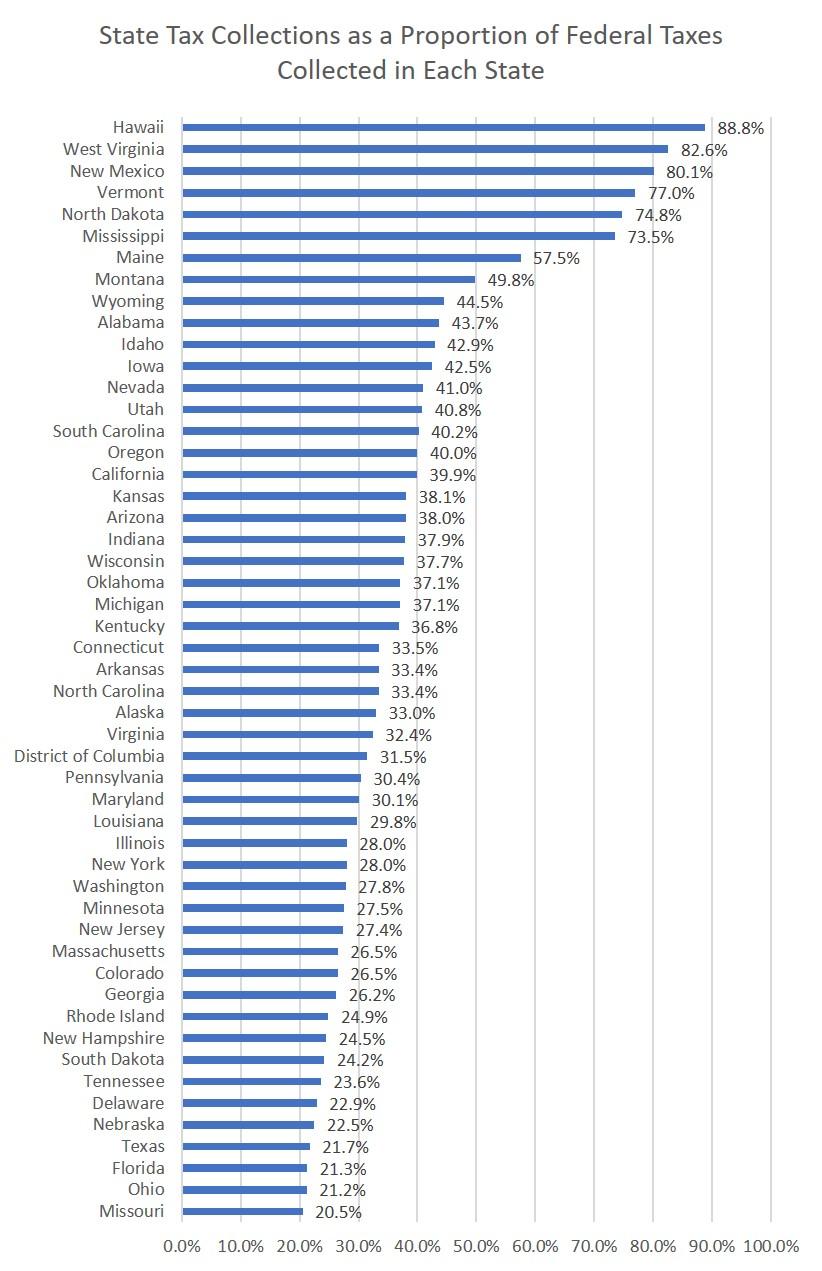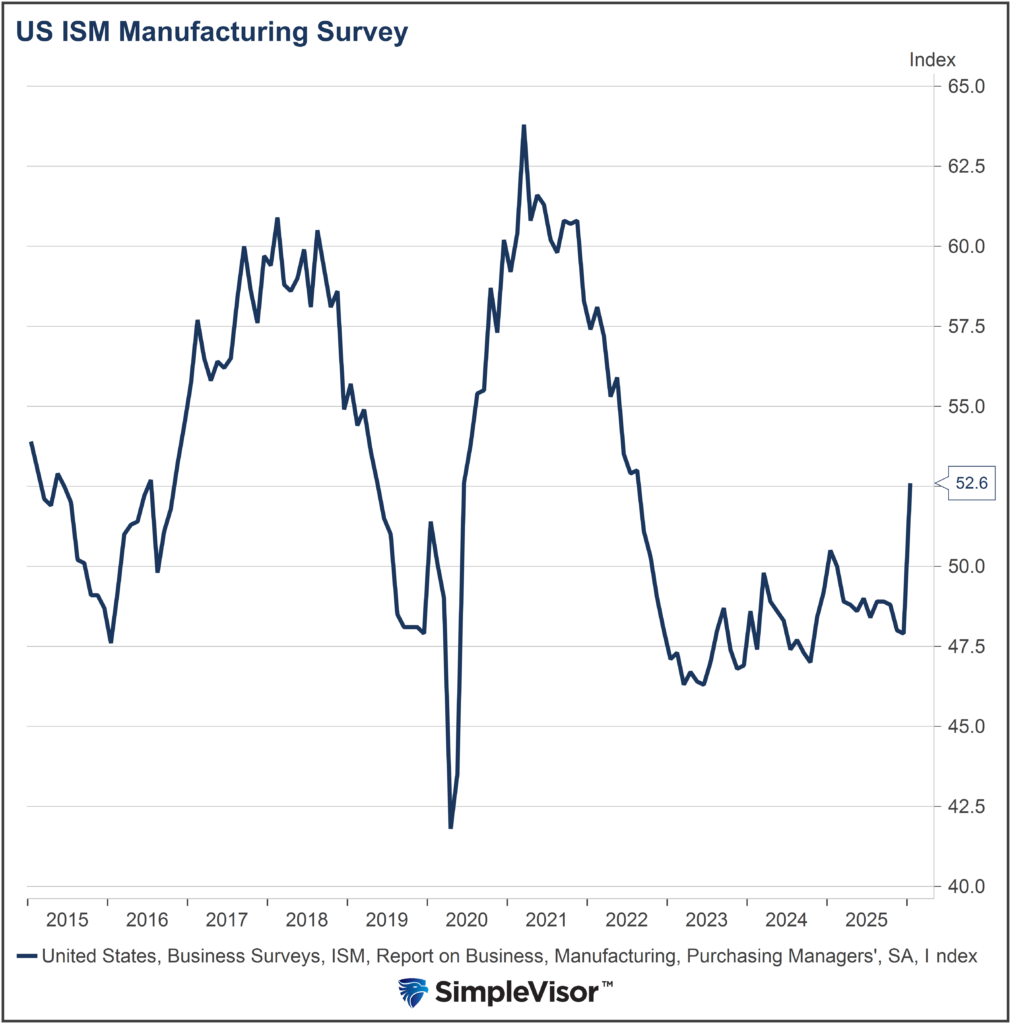| In 2021, it’s clear Americans now have thrown off any notions of subsidiarity and instead embraced the idea that the federal government should be called upon to fund pretty much anything and everything. From “stimulus checks” to “paycheck protection,” it’s assumed an entire national workforce can be propped up by federal spending. Moreover, in the wake of 2020’s Covid Recession, every pressure group from local governments to weapons manufacturers looks to the federal government to offer ever larger amounts of federal spending ladled out from the federal pot of more than six trillion dollars of annual spending. Need some “infrastructure”? The federal government will pay for it. Need a bailout? You know where to go.
And how is all this spending possible? Naturally, it can only happen when governments tax or borrow. |
IRS Collections vs. State Tax Revenues |
And the federal government does a lot of that. Moreover, the federal government can borrow in increasingly stunning amounts thanks to the monetization of debt going on at the central bank.
The Feds Tax Us a Lot More than the StatesBut even if we ignore all the ways the federal government can spend at astronomical levels thanks to huge deficits and monetary tricks, we find the feds are still very much in the game of collecting good old-fashioned taxes. And lots of them. Moreover, the feds are collecting a lot more in taxes than even all state and cities combined. When it comes to taxes, the federal government is the biggest game in town, and it should surprise no one that everyone is looking to DC for some easy cash. We might hear a lot about how “blue states” are levying crippling taxes on their residents. But not even the governments of California or New York have anything on the federal government when it comes to extracting wealth from the taxpayers in America. According to a 2018 study from the Tax Policy Center, for example, “Federal, state, and local government receipts totaled $5.3 trillion in 2016. Federal receipts were 65 percent of the total, while state and local receipts (excluding inter-governmental transfers) were 20 percent and 15 percent, respectively.” State and local governments may certainly be taking their pound of flesh from the taxpayers, but the fact is the federal government is taking a whole lot more. Indeed, contrary to the US’s reputation for “local control,” the United States is not particularly decentralized when it comes to tax revenues and government spending. When it comes to taxation, the central government dominates in America. In in his study on taxation, for example, Anwar Shah categorizes the United States as “centralized,” noting—with numbers similar to those of the Tax Policy Center—that the federal government collects more than sixty percent of all tax revenue in the nation. This puts the US in the same category—according to Shah—as Brazil and Russia. On the other hand, only 37 percent of all tax revenue is collected by the central government in Switzerland, a “decentralized” tax system according to Shah. In other words, the state and local governments in Switzerland collect most of the taxes, while the situation is reversed in the United States. This becomes even more clear when we look at tax collections on a state-by-state basis. Using 2019 data from the IRS we see that total federal tax collections coming out of California amounted to approximately $472 billion. But state tax collections totaled about $188 billion.1 Put another way, the total state tax bill in California was 39 percent the size of the federal tax bill. Or, for every dollar the federal government collects from Californians, Californians pay their state government 39 cents. The difference is even more obvious in many other states. In Florida in 2019, the federal government collected $210 billion from the taxpayers. The State of Florida, meanwhile, collected $44 billion. In other words, for Florida residents, Florida’s tax bill was only one-fifth the size of the federal tax bill. |
|
| Source: IRS state-by-state revenue, and the Census survey of state tax collections.
Even in big states with huge tax hauls like New York, Illinois, and Pennsylvania, state tax collections don’t even begin to rival the taxes pulled in by federal payroll taxes and income taxes. In fact, no state collects as much in taxes as the Federal government collects. Hawaii comes the closest, where Hawaii residents pay 88 cents in state taxes for every dollar collected by the federal government. |
StateTax Collections as a Proportion of Federal Taxes Collected in Each State |
| But nearly all states collect less than fifty cents for every dollar collected by the federal government. | |
Source: IRS state-by-state revenue, and the Census survey of state tax collections.
Local governments tend to collect an even smaller amount than states, when compared to federal spending.
The political implications for this are large. Thanks to the Sixteenth Amendment, the federal government is able to tax Americans directly and it does so in amounts that are usually more than double what the state governments pull in. This puts an enormous amount of power in the hands of federal officials, and it means fiscal power in the United States mostly resides in the hands of federal policymakers. (We could contrast this with Switzerland where the federal power to tax expires without an affirmative vote extending this power every ten years or so.)
It’s a big reason why we’re now seeing state governments go to the federal government seeking bailouts—and why interest groups spend so much time and energy focusing on federal laws, taxes, and regulations. It’s only natural that they should. Washington, DC is where most tax money goes in America, so we should expect to find most of the political power there as well. Once we consider that the federal government—with the help of the central bank—can spend far beyond even what it collects in taxes, we should not be surprised that in times of fiscal crisis, state and local governments go running to the feds. As the old saying goes, he who pays the piper calls the tune, and with states playing the part of junior partner in the taxation game, we should expect them to be junior partners in every other sense as well.
- 1. US Census Bureau: 2019 Annual Survey of State Government Tax Collections by Category Table.
Full story here Are you the author? Previous post See more for Next post
Tags: Featured,newsletter

































